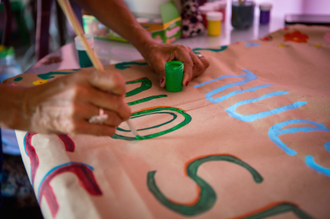CAFOD: Killing of Colombian community leaders must stop if peace process is to succeed

Source: CAFOD
As the number of Colombian community leaders killed and threatened reaches unprecedented levels, UK aid agency CAFOD is calling for more protection for these leaders, who are crucial to the country's peace process.
Earlier this week, the charity was shocked and saddened to hear that Belisario Arciniegas García, a community leader in Micoahumado, where the charity is supporting peace-building projects, had been killed.
García, a farmer and candidate for local council elections, which are due to take place later this year, was intercepted on 7 May by members of The National Liberation Army - a guerrilla group in Colombia commonly known as the ELN - and murdered.
This is the latest in a series of killings in recent weeks which have targeted community leaders in rural Colombia.
Just three days later, on 10 May, Wilmar Carvajalino, a driver who was part of an organization of miners and farmers who were demanding their rights, was assassinated.
Uli Beck, CAFOD's Colombia programme officer, said: "Colombia is one of the most dangerous places on earth to be a human rights or land defender - and, despite the ongoing peace process, the threats and killings of human rights defenders are increasing.
"Colombia's community leaders are fighting for the rights of local people and trying to make peace a reality and if these killings and threats continue to be overlooked, it sends a strong message that the peace process is at serious risk."
Micoahumado in the Magdalena Medio region is one of the areas where Colombian charity the Peace and Development Programme (PDP) is implementing peace-building projects, supported by the European Union and CAFOD.
For decades, rural and remote communities across Colombia, including the community of Micoahumado, have been affected by violence and human rights violations by guerrilla, paramilitary and security forces.
In many cases, this has led to forced displacement and tensions over land ownership for the use of natural resources. This has been exacerbated by a lack of a strong State presence in remote areas.
In 2016, a peace agreement with Colombia's largest guerrilla group, The Revolutionary Armed Forces of Colombia (FARC), was reached, but peace negotiations with the ELN broke down in January 2019. Now, local community leaders are calling for State institutions beyond the police and army to be present in their communities.
"Armed actors in these communities, including security and guerrilla forces, must respect International Human Rights law, and not draw civilian populations into their combat," continued Beck.
"As well as an impartial investigation into those responsible for the killings, local authorities must work to establish effective measures to protect those who are at risk.
"The protection of Colombia's rural and remote communities, which would include an increased presence of State institutions in remote areas, is urgently needed if the peace process - which was sorely fought for - is to be successful."


















